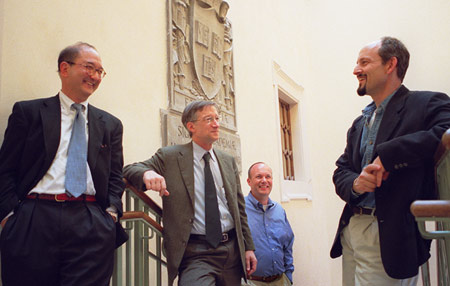Four honored as College Professors
Recognized for both teaching and research

Four faculty members have been named this year’s Harvard College Professors in recognition of their outstanding work as undergraduate teachers as well as for their exceptional achievements in graduate education and research.
This year’s honorees are Jeremy Bloxham, professor of geophysics; Marc David Hauser, professor of psychology; Stephen Rosen, the Beton Michael Kaneb Professor of National Security and Military Affairs; and William Mills Todd III, the Curt Hugo Reisinger Professor of Slavic Languages and Literatures and professor of comparative literature.
“I’m so pleased to be able to honor and reward four colleagues who contribute with such distinction to the education of our undergraduates,” said Jeremy R. Knowles, dean of the Faculty of Arts and Sciences.
The five-year chairs are endowed by a gift from John and Frances Loeb. Harvard College Professors also receive a semester of paid leave, commensurate summer salary, or funds to support scholarly work.
Bloxham, who teaches courses on planetary structure and evolution, the dynamic processes that give rise to planetary magnetic fields, and mathematical methods in the study of science, said that his primary aim as a teacher is to try to understand his students’ perspective.
“I try to put myself in their shoes to imagine what they would find challenging in the material, and then to figure out how to get the difficult points across,” he said.
Bloxham also tries to convey his own excitement about the mysterious and baffling processes in the Earth’s interior that he has always found so fascinating.
“One of the surprising things about this subject is how little is known. We know more about outer space than we do about what’s happening under our feet.”
Bloxham’s approach to teaching applied mathematics is slightly different. He tries to remember that the students in this course have different ability levels and are taking the course for different reasons.
“It’s a service course that they have to take. It’s a matter of persuading them it’s not like that trip to the dentist they’ve been putting off for so long.”
Hauser said that his teaching method varies according to whether he is working with students in a lab course, conducting an undergraduate seminar, or lecturing in his popular Core course, “Science B-29, Evolution of Human Nature.” But there is a common thread that runs through his teaching, he said.
“It’s about getting people to question things, not just about giving them information.”
Hauser said that his Core course is probably his most challenging teaching assignment because the students are from such varied backgrounds, representing all concentrations – from the humanities to the natural sciences – and ranging from freshmen to seniors. But the great advantage of the course is that the material is so stimulating that he does not have to work hard to engage the students’ interest, he said.
In his lab courses, which focus on learning in animals, Hauser believes in giving undergraduates leeway to design their own experiments and undertake original work. It is an approach that has paid off.
“In the lab, everybody has a voice, everybody thinks about the design of experiments. Undergraduates are significant contributors along with post-docs. Eighty to 90 percent of undergraduates leave the lab with a publishable paper,” Hauser said.
Rosen, who directs the John M. Olin Institute for Strategic Studies, said that for him teaching is not really about transmitting data. If that were the case, giving a student a paper to read would be just as effective as lecturing for an hour in class.
“Teaching is about changing the student’s emotional state, making the timid students more intellectually adventurous, making the cocky less sure that they know all the answers,” he said.
Since Rosen teaches a subject that is a hot-button issue for most people, his task in the classroom is to get students to regard the material from a more detached, intellectual perspective and avoid bringing their feelings into play.
“Sometimes teaching is about toning down the emotional state of the students, making them less angry or afraid, which is a particular issue for me since I teach about war,” he said.
Nevertheless, nothing is as important to Rosen as conveying to students the excitement that he himself feels about his subject.
“More than anything else, teaching is about making the students excited about the material, because if you can do that, they will teach themselves.”
Todd said as a literary scholar he is accustomed to paying very close attention to texts, and therefore the most important aspect of teaching for him is to prepare carefully for class discussions.
“I think students are generally very forgiving and are open to a variety of teaching styles,” he said. “But they tend to respond well to teachers who prepare seriously for class, who take the subject seriously, and who conduct discussions on a high level.”
He said that he considers himself lucky to be teaching the 19th century Russian novel, because the readings tend to be extremely appealing to students.
“These are wonderfully gripping novels, and they tend to have young people as protagonists who are asking very big questions about things like God and Man and Society.”




